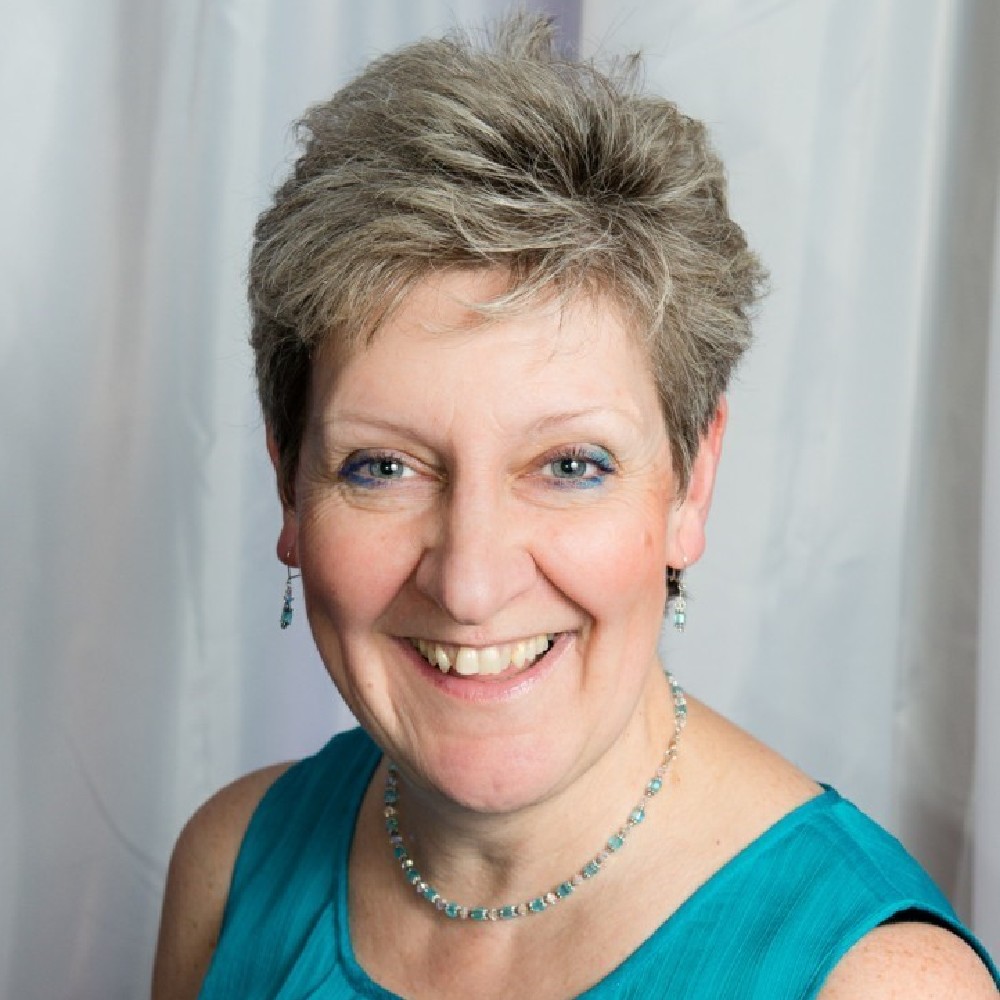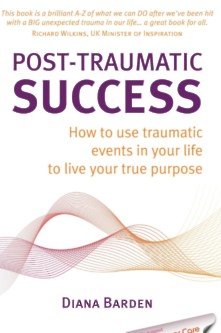
Diana Barden

The idea for Post Traumatic Success came as a result of a number of traumatic events I experienced around 20 years ago, starting with my breast cancer diagnosis at the age of 32. I realised by going through the experience that for those around you, the traumatic event is just that; an event, a snapshot in time, after which they expect you to move on and continue life as ‘normal’, in other words, as if the event had never happened. Yet for the person concerned, often there is no longer any such thing as ‘normal’ as others would understand it. My body no longer looks normal by most people’s standards, and as a human being with memories, feelings and the ability to rationalise, my mind too has altered from that which previously might have been described as ‘normal’.
This book is designed to help those who, having gone through the traumatic event itself and a period of adjustment to a new ‘normal’, are left with unanswered questions: Why did I have to go through that traumatic experience? What was I meant to learn? Was it a sign? Why does my work/career/life seem to leave me unfulfilled now? How could I help others with my experience? Why can’t I feel ‘normal’ again? Why don’t my old friends seem to understand me anymore?
Why do some people feel that life will never be the same again after a traumatic event and others want to forget it?
A traumatic event can leave a whole host of emotions in its wake – ranging from self-pity, loss of self-esteem, even anger, to guilt, shame and self-blame. Some will seek comfort in returning to the safety of the past, the known, the tried and tested. By returning to their job, their home or their relationship, they hope to erase or at least minimise or dilute the enormity of what has happened. For others, however, the past may seem trivial, pale or pedestrian after a life-changing or life-threatening trauma. They are a different person, their horizon and their expectations of life have been altered forever.
Some people see a traumatic event, job loss, bereavement or life-threatening illness, for example, as a sign that they are not following their true purpose; they see the trauma as an opportunity to make changes in their lives – in their work, in their lifestyle, or in their contribution. Some might give up their job and go travelling, re-train to do something they consider more worthwhile or start their own business.
Whatever their choices, most people who experience a trauma will find themselves living their lives more consciously and with greater sense of self-awareness as a result.
How important was it to collect the true stories for this book and can you tell us a bit about the process?
I have spent the last 20 years unconsciously collecting true stories, so those already made up a vital part of the experiences I wanted to use in the book. I decided against writing about individual case studies, choosing instead to weave others’ experiences into the flow of the book. I didn’t want to make it about breast cancer specifically, even though that was my first traumatic event. After all, even something like this horrible disease is experienced differently by everyone affected, there are so many facets to the way trauma is perceived and dealt with. I wanted the reader to feel the book was written specifically for them, and not about others with various different traumas. The true stories have come to me over the years as people, mainly women, have felt compelled to connect with me and share their experiences.
Why did you want to help others after your experience?
I have always worked in the arena of helping others – in my career as well as my voluntary work. In fact I felt called to join Breast Cancer Care as a volunteer long before I was actually eligible to join (you have to be two years post-treatment yourself before you can apply to become a volunteer). My breast care nurse at the hospital kept telling me I wasn’t ready yet; she was right, of course, even though I didn’t want to acknowledge it. You have to be ‘safe’ for others, you can’t be in danger of crumbling or being affected when hearing other people’s stories of fear, heartbreak, hopelessness or whatever. I have always felt very strongly that there’s a reason I’ve gone through the various traumatic experiences that I have, and that I’m fairly outgoing and articulate. I believe I was meant to go through what I have so I could empathise with others in similar situations, and help them to see they have choices, maybe not in what happens to them, but in how they deal with it, and the meaning they give to what happens to them.
I may sound fairly ‘together’ about my cancers and my divorce now, but each event has taken years of repair, healing, teaching myself to make better choices, ask myself better questions, be kinder to myself, etc. Each one has been a journey in itself; finding your own post-traumatic success doesn’t happen overnight. It’s a process, a process of learning, self-discovery, of lots of trial and error and mistakes along the way. If I can accompany others along their journey, and facilitate that process, then I feel I’m living my true purpose, as the strapline of the book suggests.
Please tell us a bit about Damsels in Success Cambridge.
Damsels in Success is a national movement for women who want more success without the stress. It offers women personal development and support on their journey to finding their true purpose, whether that is an entrepreneurial venture, a business, or purely becoming happier, more content and more successful on their own terms in their own lives. Through Damsels I offer my members personal development and learning, as well as the support to be able to have it all, without having to do it all. Women work best in collaboration and in community with others, yet many of us are very accomplished at working within a very masculine model of the world; one that is dictated by deadlines, goals and single-minded focus. Whilst these attributes are vital for a successful business, they are not the be all and end all of a balanced lifestyle. Damsels in success is a community, a peer group of women around the country who want to help other women to create the life that makes them truly happy. I play a small but important part in that process with my membership in Cambridge, and with the Damsels in Success community across the UK.
Tell us about your role as a volunteer peer supporter.
I knew from a short time after my breast cancer diagnosis that I was put here to help and support others, and that everything I had done and learnt up to that point, had led me in some way to working with other breast cancer survivors. At my diagnosis I had never heard of Breast Cancer Care; it was long before the days of the internet (New Year’s Eve 1993), websites, Facebook etc. so my only real way of finding support was by using the phone book and asking others for recommendations. When my breast care nurse put me in touch with Breast Cancer Care, it was really after the time I could have done with the support myself, and that made me all the more determined to offer other women the support I couldn’t find when I was in greatest need.
Sue, my breast care nurse, was absolutely fantastic, my greatest supporter, with just the right measure of support and challenge. She supported and held me in those early days of shock, fear and general self-pity, and slowly and very gently, began to challenge me to take on more, push myself, get back into my post-grad studies, re-start ‘normal’ life, etc. I don’t even really know how she made that transition, it was very natural, subtle and very, very positive for me. She was my rudder, my barometer in those early days and weeks. I learnt so much from her, I hope I’ve managed to be and show some of that for the many hundreds of women I’ve supported over the last 18 years.
A peer supporter is someone who helps in the here & now; someone to sound off to, a shoulder to cry on in those early days, and someone to act as an accountability partner, gently challenging the client to come to terms with the diagnosis she has received and create her life according to the new reality. A peer supporter will usually work over the phone, occasionally face to face depending on geography, over the short to medium term, helping the newly diagnosed client to come to terms with and thrive in her new reality.
Post-Traumatic Success really picks up where peer support tails off. There comes a point where a client needs to continue her journey without the constant help of a peer supporter by her side, and become accountable to herself for her future, her health, her lifestyle. Post-Traumatic Success is there to help people decide what success means to them in their new post-traumatic life – and helps them to go and get it.
What is your best tip for post traumatic success?
My best tip, as all of my clients, past and present know, is ‘you always have choices, even when you believe you have none’. Some might seem unpalatable, unacceptable or even unattainable, yet they are all choices. The second part to this is that we always make the best choice with the information we have available at the time. After all, you wouldn’t deliberately make a crappy (bad) choice, would you? Therefore we always make the best choice we can. Of course, new information may show up down the track – that’s only natural, but of course we didn’t have that information at the time, so it’s easy to judge a choice or decision based on 20-20 hindsight.
What is next for you?
I’m in the process of creating a Post-Traumatic Success coaching programme around the messages in the book. This is a group coaching and learning process designed specifically for women who want to find their own version of success on their own terms. That’s not to say that men don’t need this too, I’m sure they do. Women learn and develop very differently in an environment where they don’t feel compelled to compete with or adapt to the men in the group. Thirty years of management training in the corporate world has taught me this.
And I’m also working on my next book… seeing your legacy in print is very empowering, not to say addictive!

